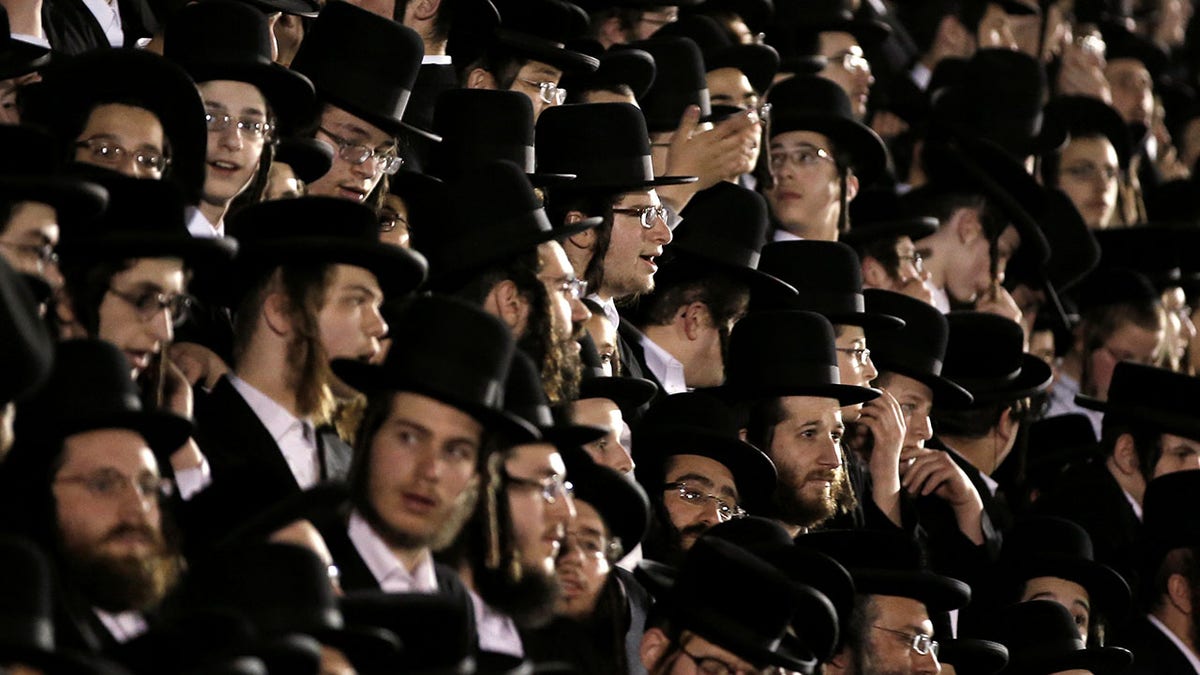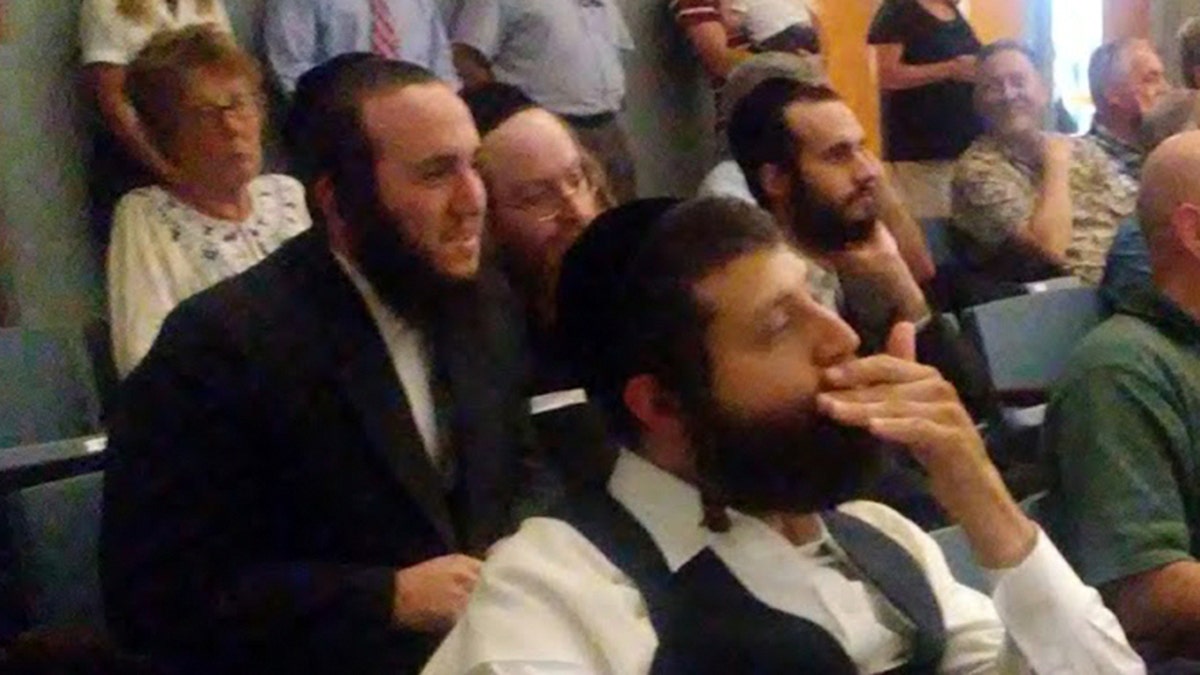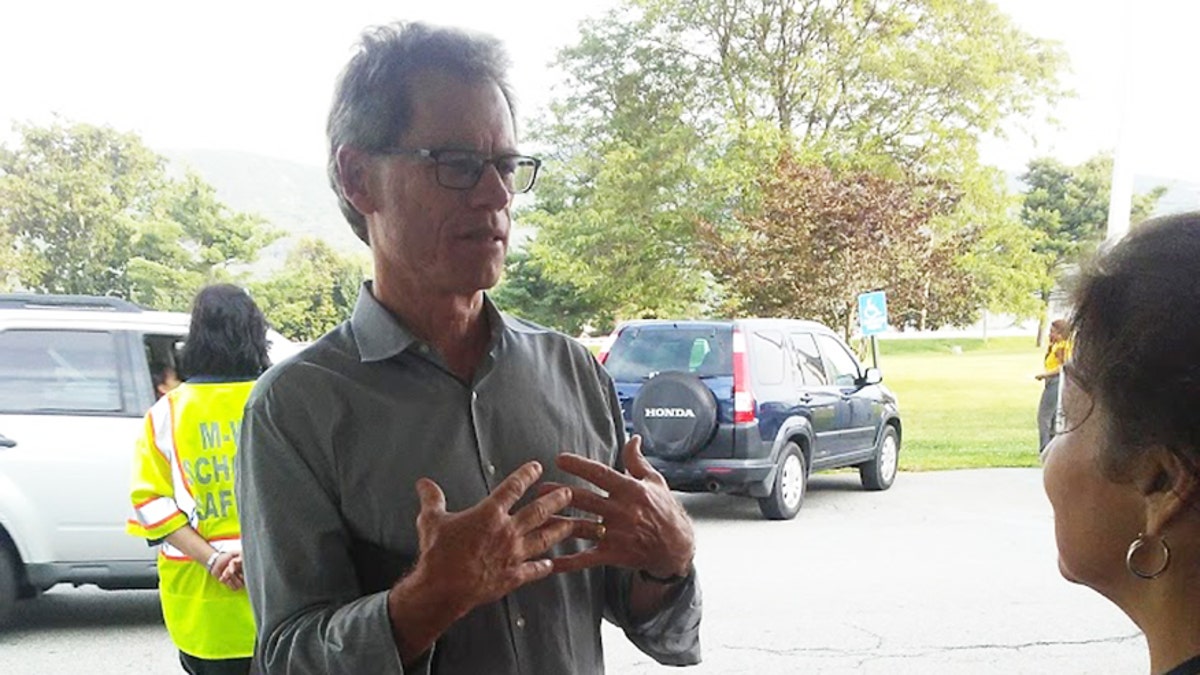
Orthodox Jews of the Satmar Hasidim crowd bleachers near a bonfire in the New York village of Kiryas Joel. (Reuters)
CENTRAL VALLEY, N.Y. – A growing rift between the tight-knit Hasidic communities of New York state and their Gentile neighbors, who increasingly feel threatened by the expansion of the Orthodox Jewish groups, is on full display this week at a pair of town hall meetings to explore what would amount to a municipal divorce.
The occasion for the hearings is a proposal to turn a predominantly Hasidic village in the town of Monroe, N.Y., into its own town – provided Monroe officials donate 56 acres to what is now the village of Kiryas Joel.
Leaders of Kiryas Joel have said they're all for the proposal and have already come up with a new name for their community, Palm Tree. But other residents of Monroe are divided. Some say a separation is the only way to save Monroe’s suburban character from the encroaching political and economic dominance of the Hasids. Other Monroe residents worry that the price – donating land to Kiryas Joel – is too high or that negotiations between Monroe and Kiryas Joel officials have been too secretive.
There was lots of emotion among the Gentiles who testified.
“It’s gotten worse and worse,” Orange County Executive Steve Neuhaus said Tuesday at the nearly three-hour hearing in the auditorium of the Central Valley Elementary School, located about 40 miles north of New York City.
The power struggle with Hasidic residents, Neuhaus said, was creating “a political Chernobyl that’s spilling over into other towns.”

Residents of the Hasidic village of Kiryas Joel at a hearing in Orange County, New York about a plan to let them annex land from the town of Monroe and form their own town (Photo by Elizabeth Llorente)
Neuhaus urged the 21-member Orange County legislative committee to allow a voter referendum on a plan – negotiated between a citizen group called United Monroe and Kiryas Joel – calling for Kiryas Joel to get 56 acres in addition to 164 acres it annexed in 2015.
The town of Palm Tree would include Kiryas Joel, a 1.1-square-mile village of 22,000 people who live in high-rises and whose population grows about 6 percent every year.
Only about a dozen Kiryas Joel residents attended the hearing; another was planned for Wednesday in their village. The residents, all men, sat or stood in the back of the auditorium. None of them went up to the microphone to address the county legislators.
But in interviews with Fox News, they said they wanted to secede from Monroe and have their own town and elected leaders.
“This is 90 percent garbage,” said Alin Schwartz, when asked his thoughts about the assertion that his community wanted to control Monroe and push special interests.
“The Jewish community has been hearing this for hundreds of years,” he said.
“Just losers,” he added, referring to speakers at the front of the auditorium who were accusing Kiryas Joel of hoodwinking officials and flouting zoning regulations.

United Monroe founder John Egan said separation of Monroe, New York from the Hasidic village of Kiryas Joel is the only solution to years of pitched power stuggles. (Photo by Elizabeth Llorente)
“Separation is the best solution for everyone and for peace,” Schwartz said. “The Jewish community is working hard for peace. I work with non-Jews. I love them and they love me.”
Schwartz praised United Monroe for reaching out to Kiryas Joel for a peaceful solution.
Some residents of Monroe and other neighboring towns said they wanted to know more details of the plan, and said the negotiations seemed to them too secretive. But whether they were for or against having the plan go to a referendum on Nov. 7, virtually all the speakers expressed resentment over the growing clout of Kiryas Joel in many aspects of life in Monroe.
“If we do not separate now, the citizens of Monroe outside of Kiryas Joel will not be able to elect our town board members when KJ votes as a bloc,” said a handout United Monroe gave to those entering the auditorium. “This is because the voters of Kiryas Joel cannot be overcome today and are growing rapidly. Not separating now means giving Kiryas Joel the ability to control our town board, our zoning, our planning, and will mean high-density housing throughout Monroe.”
United Monroe founders said several times that they were not waging a battle against a religion, though many Hasidic Jews following the arguments felt they were.
“They want an urban lifestyle, high-rises, high usage of water” and other services, said John Egan, a United Monroe founder and key figure in the negotiations with Kiryas Joel. “We want the opposite. Separation was really the only solution.”
Michael Sussman, a civil rights lawyer, warned the legislators that the plan was unconstitutional. He said it violated the concept of separation of church and state by creating jurisdictional boundaries based on religion.
“This factionalism is what our founders railed against,” Sussman said.








































